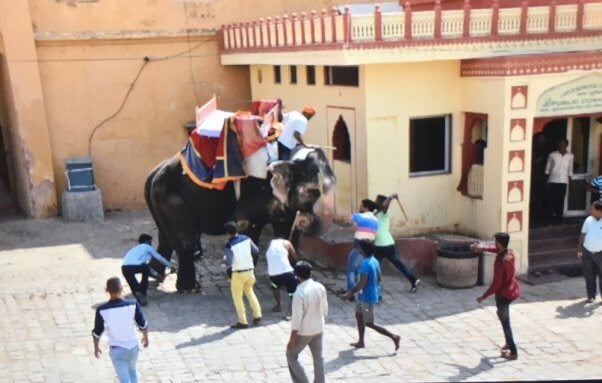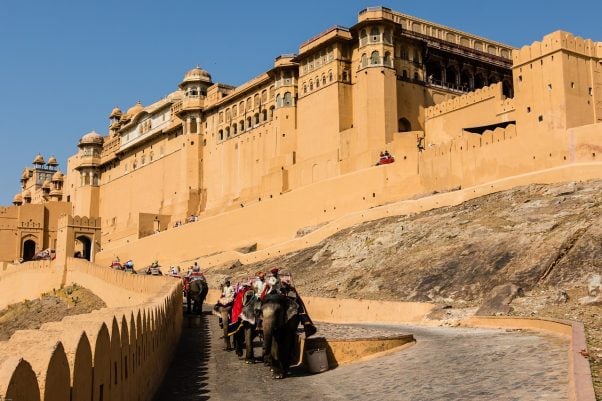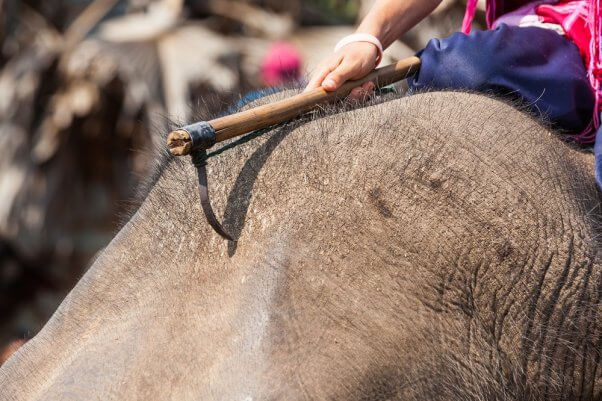9 Reasons Why You Should Never Ride an Elephant in India or Elsewhere
In Amber Fort (sometimes called “Amer Fort”) near Jaipur, India, it’s common to see majestic elephants treated like golf carts—they’re forced to toil all day, hauling tourists around on their backs, often in dangerous heat. Acts of extreme violence are no exception in India’s captive-elephant industry—they’re the norm. The more than 100 elephants forced to give rides to tourists at Amber Fort endure a nightmare that begins when they’re torn away from their mothers as babies and often only ends when they draw their last breath.
In February 2024, a distressed elephant named Gouri appeared to grab a tourist at Amber Fort with her powerful trunk and swing the person around like a rag doll. In video footage of the dramatic scene, the trainer—or mahout—who was riding atop Gouri’s head can be seen falling to the ground before staggering to his feet and chasing after the elephant.
The tourist has since sent a letter to Diya Kumari, Rajasthan’s deputy chief minister, pleading that Gouri not be punished for the attack and instead be sent to a sanctuary where she can live free of abuse.
Much of the abuse these animals endure is carefully hidden from paying visitors, but one group of American tourists caught a small glimpse of it. When an exhausted elephant tried to escape from miserable conditions on an especially hot day, eight men quickly recaptured and viciously attacked her, beating her mercilessly with heavy wooden sticks.
It’s likely that Gouri endured a similar fate after defending herself against her exploiters. Everyone who pays to ride an elephant funds the suffering of these sensitive individuals.
Nine Reasons to Shut Down Elephant Rides in India
Acts of extreme violence are no exceptions in India’s captive-elephant industry—they’re the norm. The more than 100 elephants forced to give rides to tourists at Amber Fort endure a nightmare that begins when they’re torn away from their mothers as babies and often only ends when they draw their last breaths.
9 Reasons to Shut Down Elephant Rides in India
Here are nine reasons why no one should ever pay to ride on an elephant held at Amber Fort or anywhere else—and why we must all work to shut this abusive industry down:
- When they’re babies, elephants who will be used for rides are torn away from their mothers and families. They may be born into captivity or captured in nature but are always separated from their protective mothers.
- “Training” begins immediately. The babies are tied down and jabbed with bullhooks and other weapons until their spirits are broken and they’re willing to obey their trainers in order to avoid being hurt.
- Researchers have found that elephants who are subjected to this “breaking” process (part of which can include confinement to a wooden pen called a “crush”) often develop post-traumatic stress disorder.
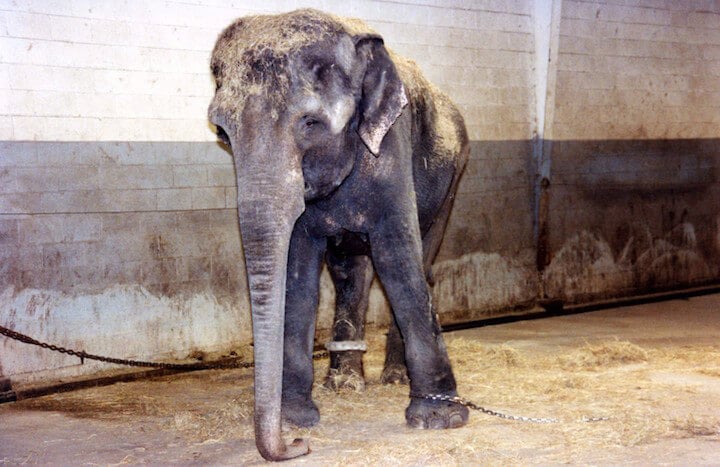
- Elephants in nature live in matriarchal herds in which they forage for fresh vegetation, play, bathe in rivers, and travel many miles a day. When they’re held in captivity, their movements are severely restricted, which often leads to painful and even life-threatening foot and joint disease.
- When they aren’t working, the animals are usually kept in sheds or shacks—which often have concrete floors that damage their legs—and bound by tight chains that can dig into their skin.
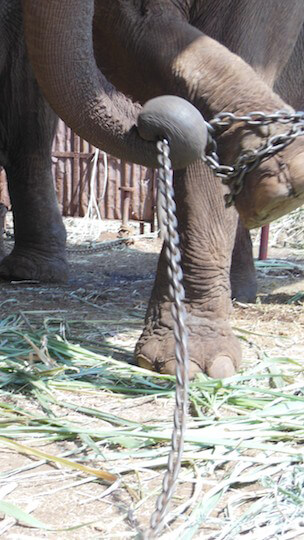
- Captive elephants are routinely denied nutritious food, adequate water, and needed veterinary care—especially for their feet, which frequently become injured and infected.
- The lack of exercise and the long hours spent standing on hard surfaces are major contributors to serious foot problems and arthritis among captive elephants. Many of them die from painful and preventable conditions such as these decades short of their normal life expectancy.
- Humans have been attacked, seriously injured, and even killed during dangerous encounters with captive elephants near Amber Fort. In July 2022, a 10-year-old child was attacked there by an elephant after reportedly trying to take a selfie with the animal, and an October 2022 incident left a local shopkeeper with severe injuries, including fractured ribs. However, these are only a few incidents that have put tourists in harm’s way or even led to human deaths around Amber Fort. When elephants attack humans, beatings and other punishments typically follow, which only make them more frustrated and upset.
- Because public awareness of cruelty to elephants has increased, many attractions are trying to dupe tourists by adding words such as “sanctuary,” “rescue center,” “refuge,” or “retirement facility” to their names. But the abusive training methods are often the same ones used at other attractions where the animals are kept captive, and the elephants are equally deprived.
In a survey of 13,000 people, one of the primary reasons travelers gave for wanting to patronize elephant rides and shows was “love of animals.” But anyone who’s concerned about the dwindling elephant population or the abuse of captive elephants should work to end these tourist traps—not fund them. The demand for elephant tourism is one of the biggest threats to the survival of wild elephant populations.
Following a series of meetings with PETA, TripAdvisor announced that it would end all ticket sales to elephant encounters—a great victory, as it’s the world’s largest travel site. More than 100 other travel companies have followed suit. If you spot any ads for elephant rides or elephant performances of any kind, please complain to the business offering them and the service selling tickets. Be sure to follow PETA on TripAdvisor for tips on ways you can be kind to animals when you travel.
You can help end elephant rides at Amber Fort by joining PETA and compassionate people around the world in calling on Jaipur authorities to protect one of India’s most sacred animals and put an end to all elephant rides in the area immediately.


